Telugu: Tummala Ramakrishna
Prof. Tummala Ramakrishna, short story writer and critic, has over ten publications to his credit. He portrays the anguish and isolation of the backward castes in his work. Having taught and supervised research in Telugu for three decades, he has become the Vice Chancellor of Dravidian University, Kuppam, Andhra Pradesh.
Adapam is a pouch where the barber keeps his tools.
~
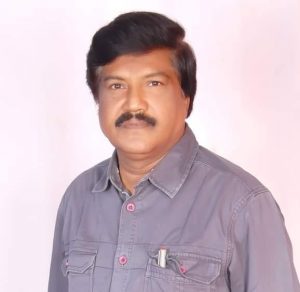 Seeing his good nature and fine workmanship, the farmers in the neighbouring villages say that Mogilappa ought not to have been born in the Mangali caste. After his father’s death, Mogilappa experienced all kinds of joys and hardships life had in store for him. Life itself had taught him how to put up and get on with life.
Seeing his good nature and fine workmanship, the farmers in the neighbouring villages say that Mogilappa ought not to have been born in the Mangali caste. After his father’s death, Mogilappa experienced all kinds of joys and hardships life had in store for him. Life itself had taught him how to put up and get on with life.
Mogilappa considers very sacred the caste occupation he had inherited with no effort on his part. Had he not inherited the profession, he would have been forced to earn his livelihood as a labourer. Going about his caste occupation is not tougher than the work of a labourer. In any case, dealing with the farming community is like walking on a sword’s edge. There are those who speak sweetly to him and “get the work” done. There are also those who use their authority and call him names. It is difficult to continue his caste occupation without hurting someone or getting hurt. On the other hand, if he gives up this work it is difficult to pull on. So, he has not discontinued the work in the two villages that have come down to him from his ancestors.
The two villages are two entities only in name. They are in fact together. The two together would not add up to even a hundred houses. Though the work that he has actually got accounts for only ten main households, he is forced to work for all the hundred.
Everyday Mogilappa would get up, finish his ablutions, have saddi , touch the God’s portrait in reverence and touch his eyes, keep the adapam under his armpit, fold the gunny sack and put it over his shoulder, and go into the village. In the village, he would begin his work with the Brahmin households, gulp down the coffee they give him and come on to the main road.
There is a tamarind tree on the road where the four streets meet. It is as if it is there just for Mogilappa. Mogilappa would push the dust to the corner with his feet, spread the gunny sack on the ground, and sit on it keeping the adapam next to him. First he would send the boy who is already there to fetch him some water. He would open the adapam, take the whetstone in his hand and sprinkle a drop of coconut oil on it. He would take out the foldable knife and sharpen it on the stone to make it sparkle.
He would brush the knife against the sharpening slab making a grating sound. In the end, he would polish it on the his left palm, insert it between his right index finger, thumb and little finger, and skillfully turn it around.
The children who gather there look on amusedly at Mogilappa sharpening his knife and turning it around. They keep watching him twist and turn the knife, worried that it might injure his hand.
The sharpening done, Mogilappa would keep his knife, scissors and comb at a convenient distance from his right hand. He would brush his palms against each other to remove the dust, and take out the tiny cloth bag from his chest pocket. He would then take out the betel nut from it, keep it near his mouth, blow on it, and pop it into his mouth. As he chews the betel nut, he would smear lime on the betel leaf, fold it and put it in his mouth. Chewing intently on it, he would take out half a fistful of betel nut shell, put it in his palm, grind it and put it in his mouth. He would spit out the saliva and cleanse his mouth. He would push the betel leaf and nut to a corner inside his mouth. Then on, look how he goes about his job! He would not put down the knife he held in his hand and work tirelessly, shaving and cutting, till the sun comes up right on our heads. He would make those who came to him like big bears go back endearingly smart.
There is not a single barber anywhere around who would give as fine a shave as Mogilappa. It seems a couple of people had even slept off while he gave them a shave. There is not another person in and around the village who could compete in assessing the shape of your head and giving the right haircut. If you wished to have a moustache like the knife tied to the fighter cock’s leg, you had to go to Mogilappa! No one could remove your finger nails and toe nails better than Mogilappa. Only Mogilappa could, with great dexterity, remove the thorn from the sole painlessly.
So Mogilappa has great confidence in himself and on his workmanship. He would not give anyone a chance to criticize him. He would say that one could do anything provided one worked hard.
It is by observing Mogilappa’s good nature that Mangali Ramanna gave his daughter Saroja in marriage to him. He gets them to live in a square shaped pucca house rather than live in a thatched hut. As Ramanna has no child other than Saroja, she and Mogilappa inherit twenty guntas of wet land and one acre of dry land. Mogilappa has taken up the responsibility of looking after Saroja’s mother too.
Slowly Mogilappa starts cultivation even as he continues his caste occupation. Thus his work increases on both counts. He has to plough the fields when it drizzles; he has also to go about his caste occupation without inconveniencing anyone in the village.
Narasaiah is the haughtiest person in the entire village. He has the upper hand in land matters. Together, his fruit garden, backyard, dry and wet lands add up to about fifty acres. Joint family. Four brothers. A house full of children. He would fix a certain amount of grains to two people and ask them to work for the entire household. He would say there would be no more incentives. For the music played during funeral ceremony he would give just five rupees. For the music at puberty related rituals he would give five with a meal. Narasaiah would perpetually quarrel with the Chakalis, Mangalis, Malas and Madigas . Even if he has enough money to drown himself, he would be careful not to drive away a crow with the hand he is eating with. Everyone has to obey his orders. If not, he would have the village assembly meet, get a few people on to his side, resolve that it is the fault of the workers, and ask them to pay a fine.
No one has the courage to oppose Narasaiah. There is nothing people with hardly anything to cover their nakedness can do by opposing him. Times have been good for him.
Narasaiah, who had a person working for him to play music during funeral and puberty-related ceremonies, arranges for band music from Singirigunta for his daughter’s wedding. He had not even thought then of the existence of the one working at home. When Mogilappa asks him, “Saami, why did you do this?” he gives the excuse, “Womenfolk were very keen on the band. What could I do?” Then on, Mogilappa has not wanted to meet Narasaiah.
… … …
It has rained just a bit after a long dry spell. It has not even wet the earth. There is a lot of excitement in the streets. Those who adjust the nose-ropes and the neck-ropes of the bullocks, those who ensure if the ropes of the yoke and the contraption to keep it tight are all right, those who tighten the iron rod to keep the yoke in place—each one of them has been busy with his work.
No one else’s plough and bullocks would run unless the plough of the Mallapollu family rolls on. For the last two, three generations word has got around that if the Mallapollu’s plough digs the earth first, there would be no scarcity of water and good crop through the year. Such is their faith. So traditionally it is the Mallapollu’s plough that has been the first to be ploughed …
The entire village is looking up towards the Mallapollu house.
Subbakka is coming back from the tamarind grove after hurling the dung basket on the garbage mound, cleaning the dung stuck to it by hitting it against the ground, balancing it on her waist by keeping her left hand inside the basket, taking out the betel nut and pan she had tied the previous evening at the edge of her saree and chewing it. Thrilled to see people on the street, she stops.
“Why have you stopped, Subbakka?”
“No particular reason, Mogilanna! Look how beautiful the village looks with just a drizzle…”
“You’re quite right, Subbakka! Small farmers are anxious to plough the little bit of land they have when the rains come. Everyone is waiting for the Mallapollu’s fields being ploughed.”
“What are you talking about? Mallappa’s son-in-law went away much before the sunrise keeping the plough-beam on his shoulder and driving the bullocks. He would have ploughed two plough-measures of land by now. Go… go….”
At Subbakka’s hastening them like this, one by one in the street begin to wield their plough-beams on their shoulders and head towards their fields spurring their bullocks on.
It seems as if a great pit has been dug next to the lake.
All around, the sounds of cho… cho… and tir… tir… are heard.
“Spur the bullock on the left—it will spoil the ridge.”
“Tighten your hold on the bullock on the right …”
“Plough on the surface… The mud pellets will rise.”
The older people are giving tips to the younger ones who have just begun to wield the plough-tails.
The bullocks to which the ploughs had been newly tied are lazily lying down on the ground.
“Close the nostrils of those bastard bulls.”
“Pour water into its nose and it would get up automatically.”
Mogilappa can’t help laughing at those words. Though Mogilappa is not as tall as the hand could reach, he is quite tall. Tying the shoulder towel around his head, tucking his dhoti in, pressing down the plough-tail, he is spurring the bullocks on.
The morning sun is quite sharp.
“Ore, Chinnoda! Go and sit under the kanaga tree, it’s hot,” he says.
“It’s all right nayana! Look here, how big this earthworm is in this mud pellet…,” Narsimhulu says pulling the earthworm out.
Though Mogilappa has not been taking his son along into the village to do the barber’s work, he has been bringing him along when he comes to the fields. He is teaching him how to wield the plough. Once in a while he would ask him to hold the plough-tail while sitting next to him and spur on the bullocks, and when they would go helter-skelter, he would shout, “Tighten the hold, you, stupid son of a … .” Mogilappa is thrilled watching Narsimhulu spurring on the bullocks, his swaying this way and that in the ploughshare unable to tighten his hold on the plough.
“Look, your mother is coming!” says Mogilappa.
“She’s bringing the saddi vessel too,” says Narsimhulu.
Sarojamma has come with the saddi vessel and stands under the kanaga tree. Narasimhulu runs to his mother and says, “Amma… Amma… I wielded the plough you know.”
Sarojamma caresses her son’s head and kisses him.
Mogilappa tightens the ropes tied to the bullocks around the plough-beam, stops ploughing and comes under the shade of the tree. He takes out the head-towel and wipes the sweat on his face. He spreads the head-towel on the floor and sits on it.
Sarojamma hands over the saddi pot to Mogilappa. She keeps the chutney she has brought in the banyan leaf next to him.
Mogilappa takes two gulps of the saddi and takes a little of the chutney on his index finger and smears it on his tongue. The chutney is a bit coarse.
“Ore, abba! You have it…,” he says.
Saying so, he hands over the pot to Narsimhulu.
“There’s a lot. You have most of it and leave just a few gulps for me, nayana,” says Narsimhulu.
Narsimhulu sits down moving the big red ant that is crawling next to him with a stick.
Mogilappa holds the pot in his hand and keeps it close to his mouth.
“It seems Narasaiahgoru wanted you to see you,” Sarojamma says as though she is muttering something.
“What? Say it loud so I can hear…,” says Mogilappa annoyed.
“He sent word through watchman Muneppa. It seems Narasaiahgoru asked you to come urgently. Seems he has to go somewhere.”
“What’s it for rich people? They can go anywhere, rule over places. He must have thought: ‘This barber fellow cultivates the little land he has as and when it rains, why should he come at all into cultivation,’ and decided to spoil my work.”
“Why do you waste your breath abusing like that?”
“You want me to suffer otherwise?”
“What’s happened now for you to be so…?”
“What should happen? If we don’t plough now we have no other go but to wait till it rains again. What’s it for them? Big people. They have tractors. They can plough any time. Our lives are not like that.”
“That’s okay. Why don’t you go and do the haircut just for him and wield the plough in the afternoon?’
“How can you enter the village and come back after doing it for just one person? That’s not done. The moment they sight a barber they come feeling their beards. The slightest indication of a sprout is enough. Though they show no sign of generosity in payment, they do not lag behind in extracting work.”
“If it’s so tough, why don’t you stop the barber’s job in the village and earn your livelihood only cultivating lands?”
“That’s what I am thinking too…”
“Go back with our son right away … I’ll untie the plough and come.”
Sarojamma turns towards the village. Mogilappa starts muttering to himself, unties the plough and ties the ropes that held the bullocks around their horns.
…..
Mogilappa keeps the adapam under his armpit and heads towards the village. Recollections of the past keep pace with his steps. His forefather’s time comes up before him.
In those days farmers used to give substantial alms and such apart from the agreed upon measure of grains. Starting from the age he could grasp things, he can’t recall ever having bought things like soap nut powder, tamarind and jaggery in a shop. What the farmers gave as alms used to last the whole year. Now no one gives even a fistful of alms. No more than the sixteen seers of paddy they had been giving from long past. Whatever may have changed this amount of grains has remained unchanged.
Bad days are here. When Reddy women who had never stepped outside their houses started to notice Kamma women tying some coins in their kongus, they too started working in the fields, with their kongus tied up and started collecting the farm produce in their baskets, coming to the fairs, keeping them in small heaps and selling them. Why would they look at the men who worked once they themselves have started seeing money?
“What’s the matter, Mogiliga! You’ve stopped looking us up.”
Mogilappa hears Narasaiah’s voice even as he starts comparing the past and the present.
“I was on my way only to your house, saami—I came into the village even a few days ago and did my work. When I asked your farmhand, he told me that you had gone to your fields in the forest. Therefore, I was coming back again to your house today.”
“Yes, you were coming. I am not denying it… In the past your father depended on this village. But now you’ve started cultivating on your own and come to do your barber’s work as and when you find the time. We have to keep waiting for your arrival. Moreover, you don’t live in this village. When we need your services, we have to send for you.”
Mogilappa cannot comprehend why Narasaiah is speaking like this. But it is clear to him that he is speaking, keeping something in mind.
“Okay saami, you have to say something and we have to listen. Otherwise, it’s not something that gets settled in a day. So long as you have a nose, you have got to be prepared for a cold. Please get the boy to bring water for the shave.”
“I haven’t grown much of a beard now. Only the other day I had sent for Narayudu, who came and gave me a shave.”
“How could you do that when I am assigned to your house to do the job?”
“I believe he has no other support. He says that if asked he would put up a small hut and stay in the village.”
Mogilappa realises that the matter has gone too far.
“What saami! You’ve started speaking crazily? How can that fellow come in when I’m still around?”
“Why, is this your father’s property?”
“Yes, it’s my father’s property…”
“You! You dare talk back to me, bastard? Have you become arrogant eating rice and curry from every other house?”
Mogilappa’s anger enters his nasal promontory.
“We are eating, working hard with our own hands. Watch your words and speak. Nobody is licking the gruel spilt from your elbow’’
“It’s not your fault. Your eyes have gone right on top of your head the moment you have started seeing twenty guntas of wet land and an acre of dry land. Bastard, I’ll send for Narayudu tomorrow itself and have him put up a hut in the village… Your pride will not come down until then.”
Mogilappa feels like kicking Narasaiah there and then with all the energy he could muster for his loose talk. Gulping down his anger he says, “Yo… if not Narayudu, you send for Narayudu’s father… If it rains a bit, my field too would be irrigated as much as yours.”
Mogilappa takes the adapam from his armpit into his hands and hurls it into the stream close by with all the force in his command. The village folk who have gathered around to listen to the exchange of words between Mogilappa and Narasaiah stand there, stunned like statues.
Italicized words in the story:
“get the work done”: means to have a haircut/shave.
saddi: left-over food from the previous night.
(Translation of “Adapam” from Mattipoyyi: Kathalu by Tummala Ramakrishna. Kurnool: Chandrakala Publications, 2004, 21-31 by Alladi Uma and M. Sridhar.)

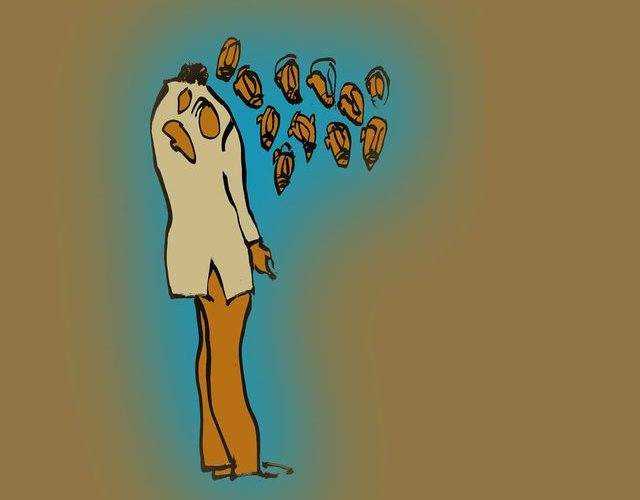


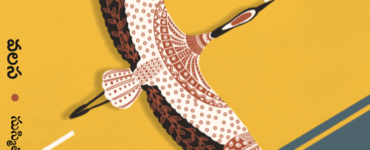

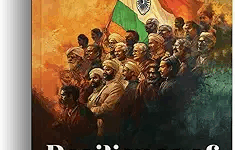
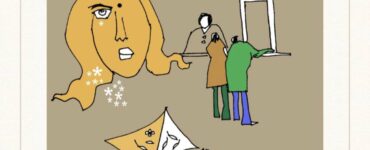
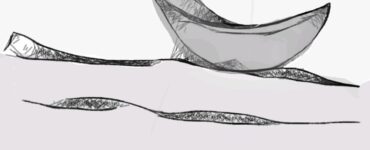
Add comment